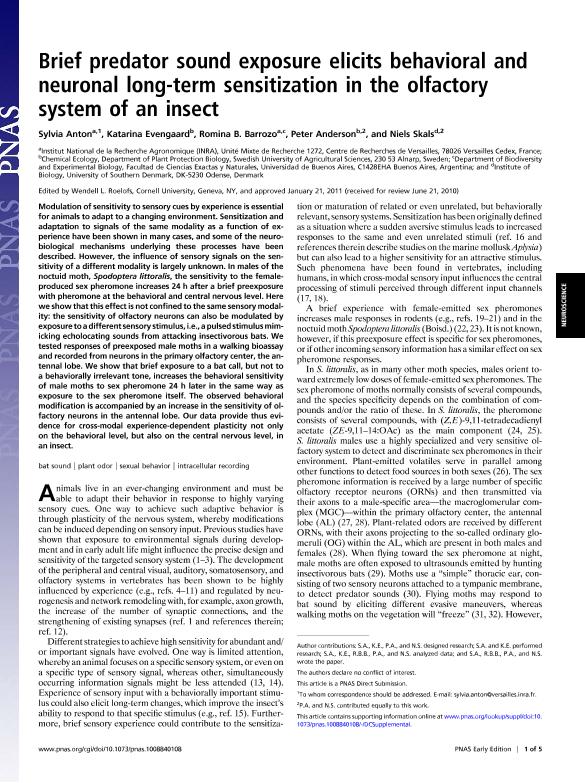Mostrar el registro sencillo del ítem
dc.contributor.author
Anton, Sylvia
dc.contributor.author
Evengaard, Katarina
dc.contributor.author
Barrozo, Romina

dc.contributor.author
Anderson, Peter
dc.contributor.author
Skals, Niels
dc.date.available
2017-05-03T19:59:47Z
dc.date.issued
2011
dc.identifier.citation
Anton, Sylvia; Evengaard, Katarina; Barrozo, Romina; Anderson, Peter; Skals, Niels; Brief predator sound exposure elicits behavioral and neuronal long-term sensitization in the olfactory system of an insect; National Academy Of Sciences; Proceedings Of The National Academy Of Sciences Of The United States Of America; 108; 8; -1-2011; 3401-3405
dc.identifier.issn
0027-8424
dc.identifier.uri
http://hdl.handle.net/11336/15943
dc.description.abstract
Modulation of sensitivity to sensory cues by experience is essential for animals to adapt to a changing environment. Sensitization and adaptation to signals of the same modality as a function of experience have been shown in many cases, and some of the neurobiological mechanisms underlying these processes have been described. However, the influence of sensory signals on the sensitivity of a different modality is largely unknown. In males of the noctuid moth, Spodoptera littoralis, the sensitivity to the femaleproduced sex pheromone increases 24 h after a brief preexposure with pheromone at the behavioral and central nervous level. Here we show that this effect is not confined to the same sensory modality: the sensitivity of olfactory neurons can also be modulated by exposure to a different sensory stimulus, i.e., a pulsed stimulus mimicking echolocating sounds from attacking insectivorous bats. We tested responses of preexposed male moths in a walking bioassay and recorded from neurons in the primary olfactory center, the antennal lobe. We show that brief exposure to a bat call, but not to a behaviorally irrelevant tone, increases the behavioral sensitivity of male moths to sex pheromone 24 h later in the same way as exposure to the sex pheromone itself. The observed behavioral modification is accompanied by an increase in the sensitivity of olfactory neurons in the antennal lobe. Our data provide thus evidence for cross-modal experience-dependent plasticity not only on the behavioral level, but also on the central nervous level, in an insect.
dc.format
application/pdf
dc.language.iso
eng
dc.publisher
National Academy Of Sciences

dc.rights
info:eu-repo/semantics/openAccess
dc.rights.uri
https://creativecommons.org/licenses/by-nc-sa/2.5/ar/
dc.subject
Sexual Behavior
dc.subject
Intracellular Recordings
dc.subject
Antennal Lobe
dc.subject
Bat Sound
dc.subject.classification
Otros Tópicos Biológicos

dc.subject.classification
Ciencias Biológicas

dc.subject.classification
CIENCIAS NATURALES Y EXACTAS

dc.title
Brief predator sound exposure elicits behavioral and neuronal long-term sensitization in the olfactory system of an insect
dc.type
info:eu-repo/semantics/article
dc.type
info:ar-repo/semantics/artículo
dc.type
info:eu-repo/semantics/publishedVersion
dc.date.updated
2017-05-02T20:59:12Z
dc.journal.volume
108
dc.journal.number
8
dc.journal.pagination
3401-3405
dc.journal.pais
Estados Unidos

dc.description.fil
Fil: Anton, Sylvia. Institut National de la Recherche Agronomique; Francia
dc.description.fil
Fil: Evengaard, Katarina. Swedish University of Agricultural Sciences; Suecia
dc.description.fil
Fil: Barrozo, Romina. Institut National de la Recherche Agronomique; Francia. Universidad de Buenos Aires. Facultad de Ciencias Exactas y Naturales. Departamento de Biodiversidad y Biología Experimental; Argentina. Consejo Nacional de Investigaciones Científicas y Técnicas; Argentina
dc.description.fil
Fil: Anderson, Peter. Swedish University of Agricultural Sciences; Suecia
dc.description.fil
Fil: Skals, Niels. University of Southern Denmark; Dinamarca
dc.journal.title
Proceedings Of The National Academy Of Sciences Of The United States Of America

dc.relation.alternativeid
info:eu-repo/semantics/altIdentifier/doi/http://dx.doi.org/10.1073/pnas.1008840108
dc.relation.alternativeid
info:eu-repo/semantics/altIdentifier/url/http://www.pnas.org/content/108/8/3401
Archivos asociados
